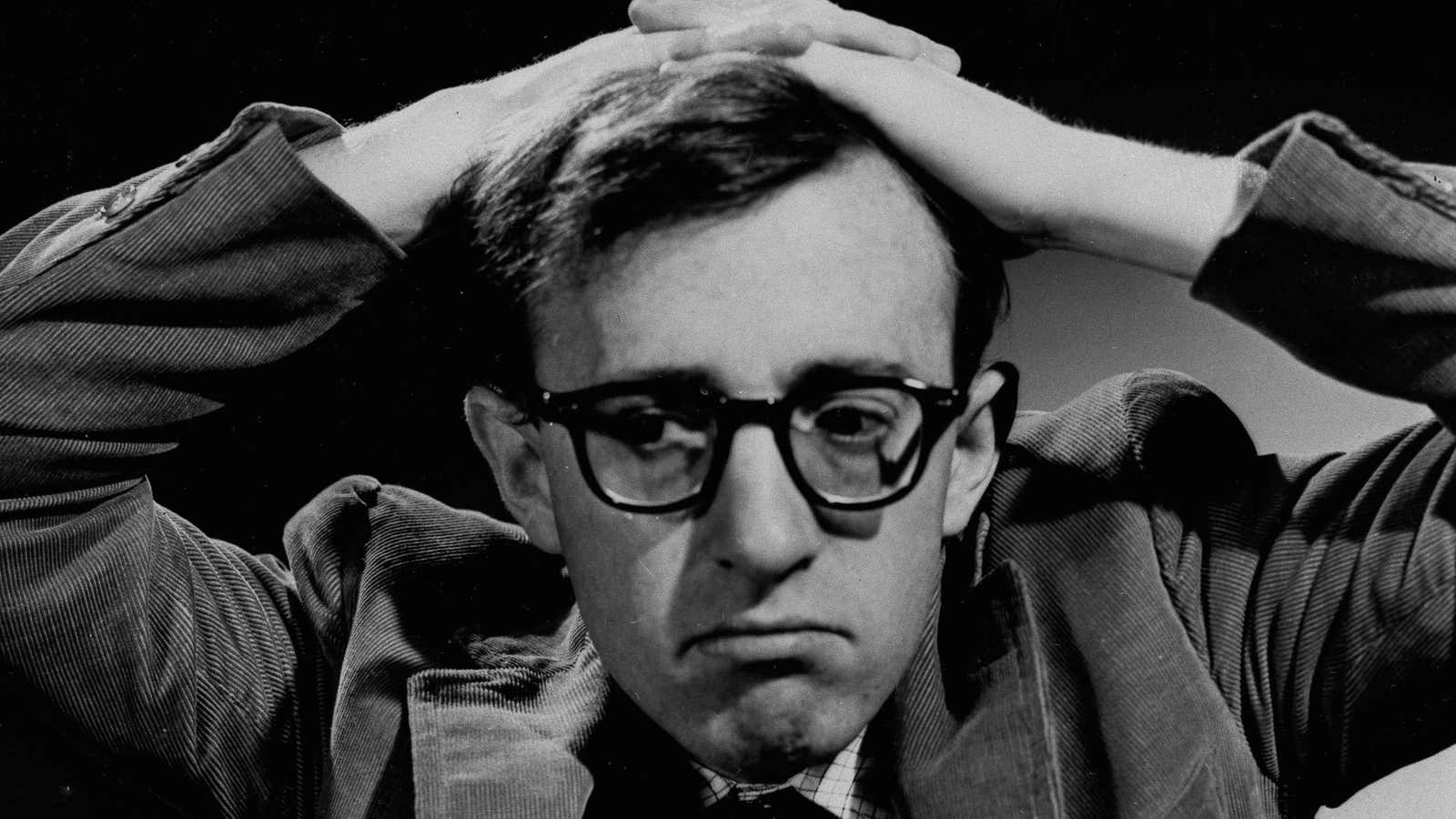It was the Scottish physician William Cullen who coined the term “neurosis” in 1769, but Sigmund Freud who popularized it as a way to describe a number of nerve disorders—distinct from the full mental break of psychosis, but debilitating nevertheless (including hysteria, phobias, depression, and hypochondria).
As psychiatrists have gotten more granular in their definitions of anxiety, however, the catch-all Freud-associated term, “neurosis,” has fallen out of favor in clinical psychology, and it was taken out of the Diagnostic and Statistical Manual of Mental Disorders in 1980. Today neurosis has been demoted: Psychologists speak instead of “neuroticism”—just a quirk of personality used on tests like the Big Five to assess a person’s sensitivity to negative emotions.
And increasingly—in the popular imagination as well as in the world of psychology—neuroticism is seen as a boost to imagination and creativity, and even a prerequisite for true genius, with figures ranging from Woody Allen to Steve Jobs proudly wearing their nerviness on their sleeves. We admiringly use words like “obsession” and “perfectionism” as synonyms for varieties of what we used to call neuroses.
A group of psychologists is now arguing that there may be some scientific basis for thinking there’s a link between neuroticism and creativity. In an opinion piece (pdf) published in Trends in Cognitive Sciences this month, Adam Perkins of King’s College London and his team posit a new theory that argues for the bright side of anxiety.
Here’s the reasoning: Neurotics are more susceptible to negative emotions because they’re particularly attuned to threats, both real and imagined. Says Perkins, the part of the brain that’s activated when we perceive threats is the same as the one that lights up when we have thoughts that seem to come from nowhere—another way of saying inventive ideas. That’s how being neurotic and being creative are related, he told Quartz. Says Perkins, “A neurotic mind helps you search out problems that other people haven’t even noticed.”
A lot more research is needed to see if Perkins’ theory is confirmed with rigorous study, but it certainly rings true anecdotally, fitting neatly with the mythologized figure of the sensitive, anxiety-plagued genius.
That archetype goes back at least as far as Isaac Newton, as Olga Khazan wrote in the Atlantic:
“For much of his life, Isaac Newton seemed like he was on the verge of a nervous breakdown. In 1693, the collapse finally arrived: After not sleeping for five days straight, Newton sent letters accusing his friends of conspiring against him. He was refraining from publishing books, he said at one point that year, ‘for fear that disputes and controversies may be raised against me by ignoramuses.'”
In the modern imagination, Apple founder Steve Jobs stands out as the quintessential neurotic genius—so obsessed with perfection that at times he seemed tortured by it.
In pop culture, too, the anxious alpha nerd is a glorified archetype. The neurotic hero found perhaps its purest expression in the characters of Woody Allen, who begins Annie Hall: ”Well, that’s essentially how I feel about life—full of loneliness, and misery, and suffering, and unhappiness, and it’s all over much too quickly.” In comedy, it later traces its path through Larry David and Jerry Seinfeld.
On TV and in film today, today’s neurotic heroes aren’t just armchair overthinkers; they’re men (mostly white men) of action. Their paranoid foresight and obsessive habits lead to adventurous outcomes: From Neo in The Matrix to Elliot on Mr. Robot, and Benedict Cumberbatch as both Sherlock Holmes and Alan Turing. The genius coder protagonist of Silicon Valley, played by Thomas Middleditch, suffers from night sweats and vomits from stress twice in the comedy’s first episode. (To which his doctor responds: “Garden-variety panic attack. Welcome to Silicon Valley. We see people like you all the time.”)
But with all this celebration of neuroticism, it’s worth noting that it’s not all Macintosh-themed rainbows on Planet Paranoia. Even if Freud’s definition was overblown, high neuroticism remains a strong risk factor for many mental afflictions, including eating disorders, schizophrenia, and substance abuse.
Personality psychologist Colin DeYoung is skeptical of the impulse to glorify the neurotic, saying that at least cognitively, the connection between creativity and emotional sensitivity is weak. Even as some psychologists promulgate the appealing idea of the neurotic genius, others say that the personality traits of openness and intellect are most strongly associated with artistic creativity as well as scientific or inventive genius.
And quite simply, says Annie Murphy Paul, author of The Cult of Personality and an upcoming book on the science of intelligence, “It’s not any fun to be neurotic or to be around people who are neurotic. We talk about it jokingly, but actually it can be a very unpleasant characteristic; it’s burdensome.”
